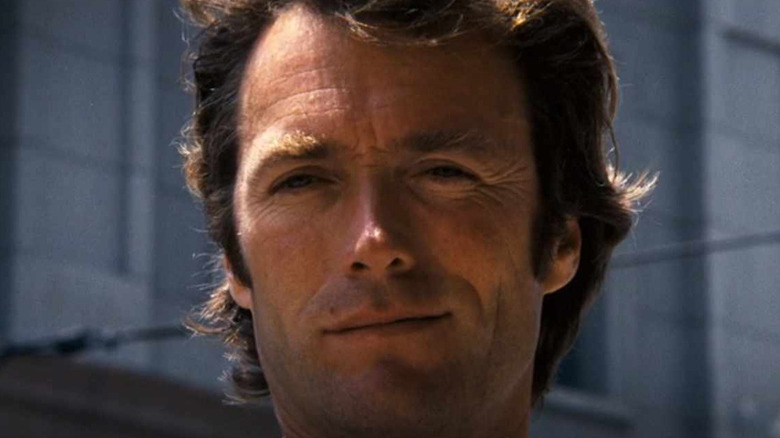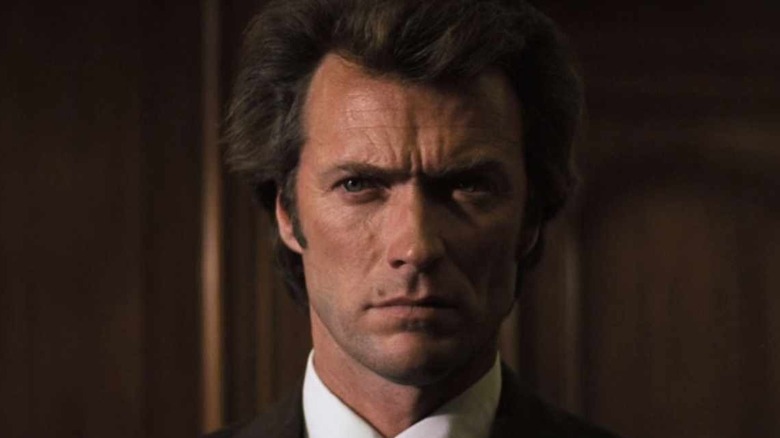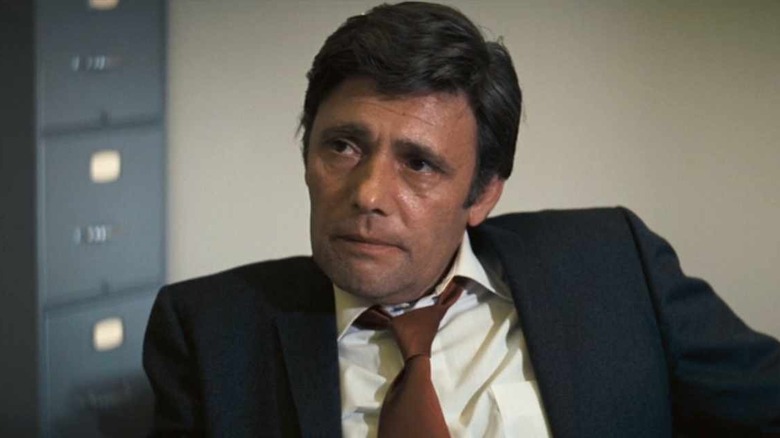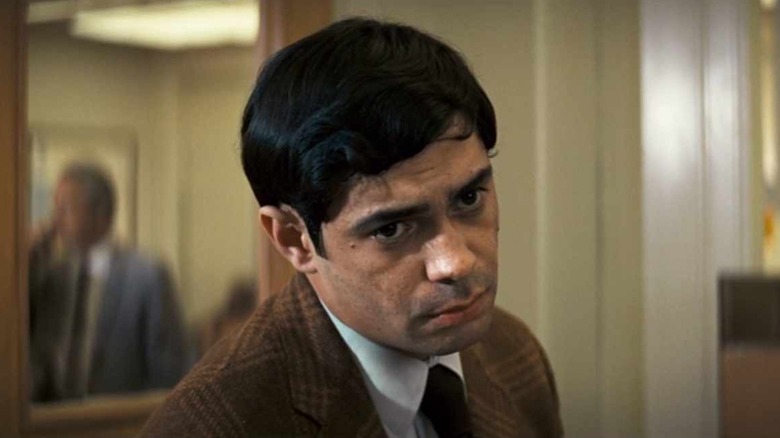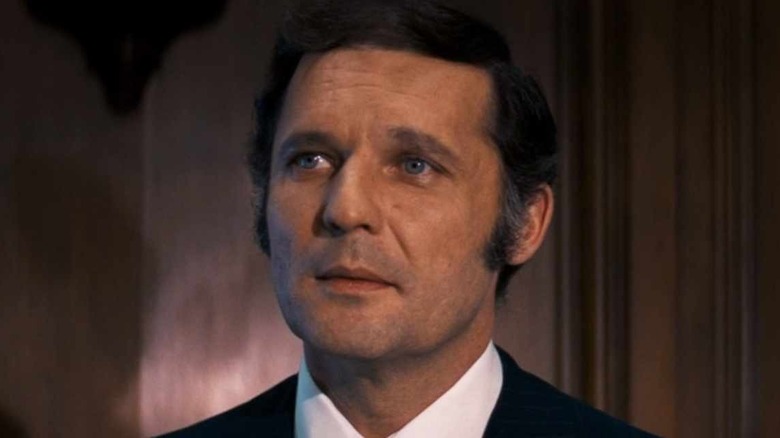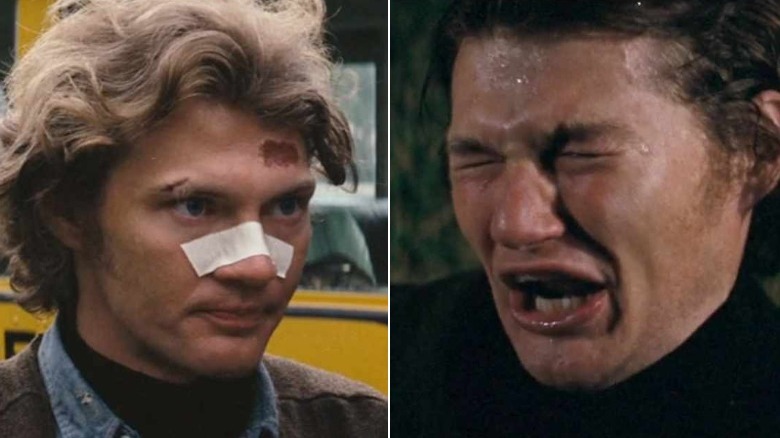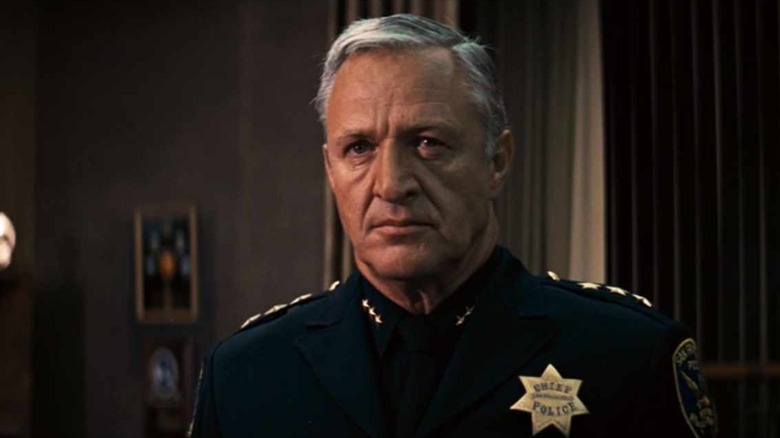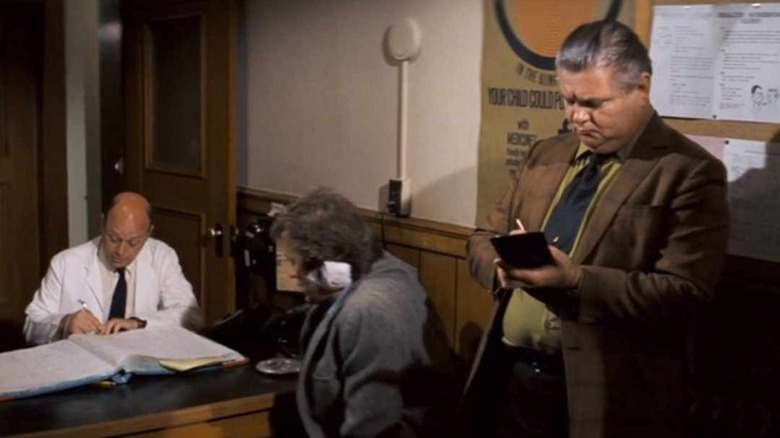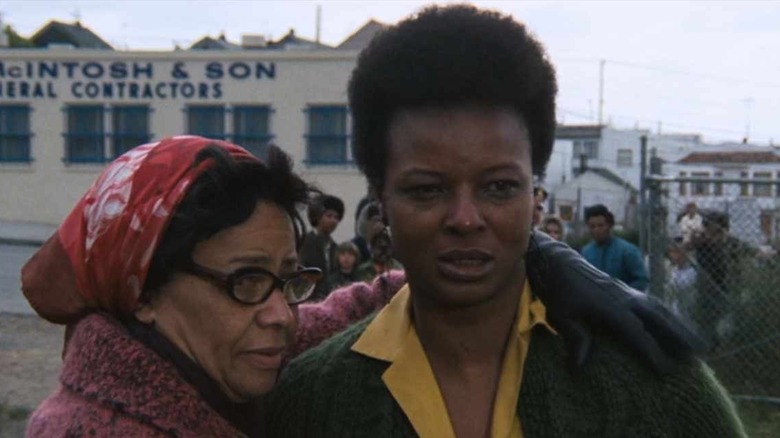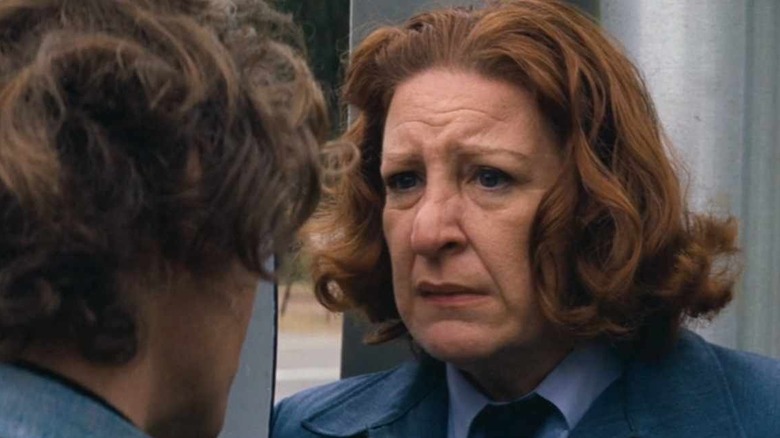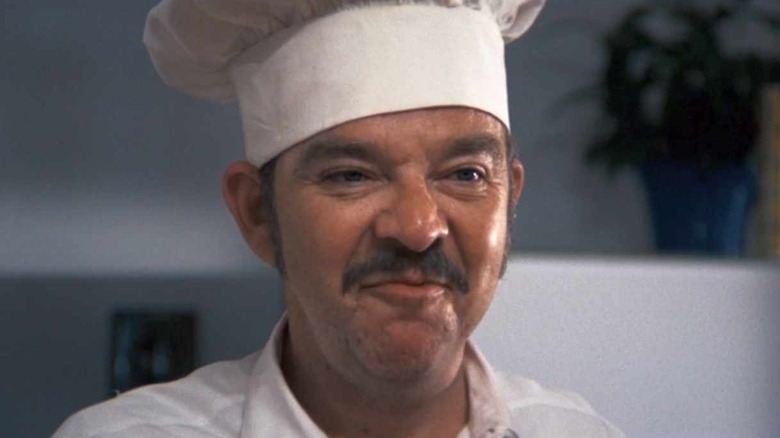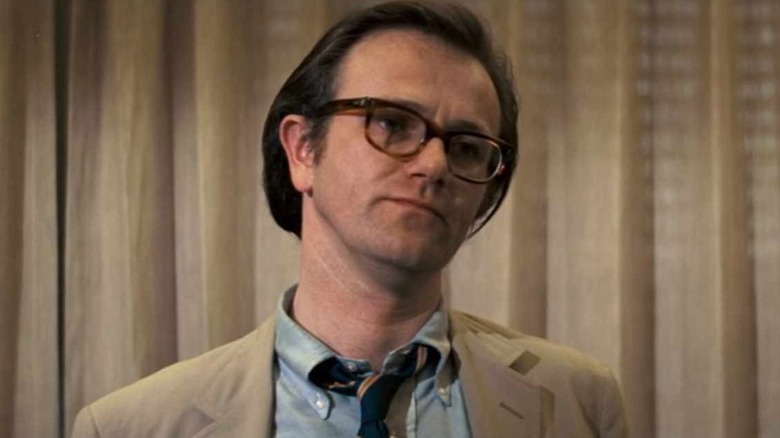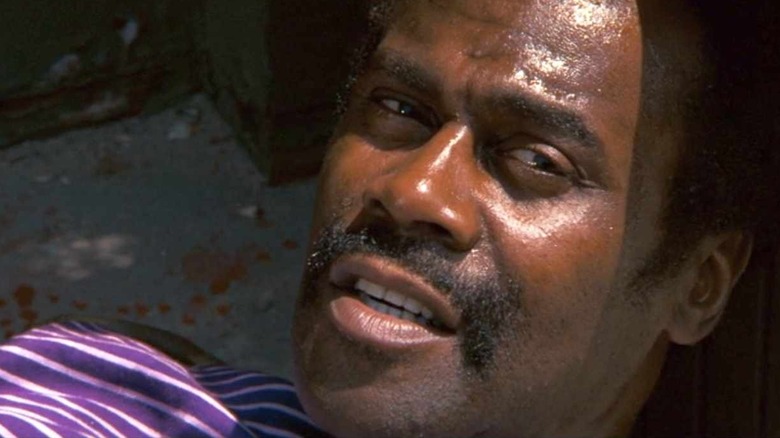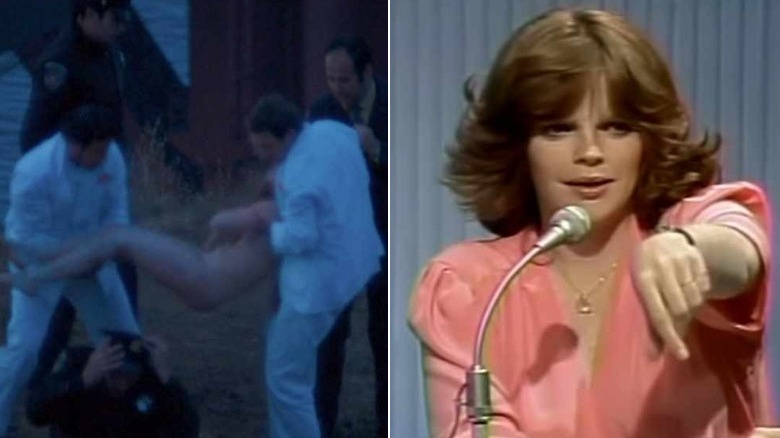Dirty Harry: Whatever Happened To The Cast?
We may receive a commission on purchases made from links.
50 years ago, America was engulfed in much turmoil and upheaval, and its film industry was too. A story by husband-wife duo Harry Julian and R. M. Fink called "Dead Right," about a rogue New York cop named Harry Callahan trying to take down a serial killer by any means necessary, was making the rounds. John Wayne and Frank Sinatra were offered the role, and directors such as William Friedkin and Irvin Kershner ("The Empire Strikes Back") circled the project. Further screenplay drafts moved the action to the West Coast, with S.F.P.D. Inspector Callahan hot and heavy on the trail of a Zodiac-inspired killer named Scorpio.
Upon its release, the Don Siegel-directed "Dirty Harry" became a hit with audiences, with them cheering on the Clint Eastwood detective "every step of the way, in doing what he had to do to bring this guy to justice." But the film was also controversial, and famed film critic Pauline Kael calling it out for being "fascist." "Harry" ultimately spawned four sequels (plus many imitators), and in the final film (1988's "The Dead Pool") it even took aim at a movie critic — who got stabbed to death.
Eastwood has since recalled that the 1971 film "sort of summed up everybody's feelings at that particular time." Five decades later, it is still stirring up fresh feelings with new viewers, so as the film celebrates its half-century birthday let's re-load, and take a fresh look at what has happened to the cast in the ensuing decades.
Clint Eastwood (Inspector "Dirty" Harry Callahan)
Inspector "Dirty" Harry Callahan and the man who played him, Clint Eastwood, require no introductions. Even if you've never seen one of the five "Dirty Harry" films, you have probably heard the line, "You've got to ask yourself one question: 'Do I feel lucky?' Well, do you punk?" and the even more infamous one uttered in the fourth film "Sudden Impact": "Go ahead, make my day."
While Eastwood had a very respectable early career on TV westerns ("Rawhide"), Spaghetti westerns ("The Good, the Bad and the Ugly"), and war flicks ("Kelly's Heroes"), "Dirty Harry" was the one that cemented his star status. It also has "gotten me out of a lot of speeding tickets through the years." The film was his fourth pairing with director Don Siegel, with their fifth and final being 1979's "Escape From Alcatraz." A role like Harry could have pigeonholed others — yet Eastwood was able to continue to grow afterwards, as both an actor and a film director. Amazingly, all 11 of his Academy Award nominations have come after he turned 60 — winning 4 Oscars, for "Unforgiven" (dedicated to Siegel) and for "Million Dollar Baby."
As for a sixth "Dirty Harry?" He said in 2008 said if there was a "truly great script," he'd think about it, but "movies that interest me now take me to new places." At 91, one of those new places was directing and starring in "Cry Macho." In a recent interview he said, "I've gotten to the point where I wondered if that was enough, but not to the point where I decided it was. If you roll out a few turkeys, they'll tell you soon enough."
Harry Guardino (Lieutenant Al Bressler)
Al Bressler often has to answer for Harry's dirty work, and was played with a colorful brashness by Harry Guardino. Guardino had no trouble with "Harry" when "my friend Clint Eastwood offered me the part and I accepted without even reading the script." He returned to his role in 1976's "The Enforcer." Guardino traveled with Eastwood again in 1978's "Every Which Way but Loose" as well as its sequel "Any Which Way You Can." He had previously worked with director Siegel on "Madigan" and "Hell Is For Heroes" (not to be confused with another film he starred in, "The Hell with Heroes").
Guardino broke into Broadway in and would earn a Tony nomination for 1960's "One More River." One his first bigger film roles was playing the owner of the "Houseboat," which earned him his first of two Golden Globe nominations — the other for 1963's "The Pigeon That Took Rome." He had featured roles on three short-lived TV series, 1964's "The Reporter," 1971's "Monty Nash," and "The New Perry Mason" remake from 1973-1974. Guardino summed up his career as such, "You can't categorize me. I've worked at being a character actor," adding, "I've fulfilled my life's dream of playing a variety of roles." He later retired to Palm Springs, where he died of lung cancer in 1995, at age 69.
Reni Santoni (Inspector Chico Gonzalez)
Detective Callahan is best left to his own devices, so when he's assigned a rookie partner who is a recent college grad with a Sociology degree, it's a disaster waiting to happen. Poor novice Inspector Gonzalez, played by Reni Santoni, paired with Callahan and asking all the key questions the audience wants to know, like how "Harry" got his "Dirty" nickname.
Santoni's first big break was playing David Kolowitz in Carl Reiner's semi-autobiographical 1967 film "Enter Laughing," based on the Broadway hit of the same name that netted Alan Arkin a Tony Award in that role. The film did not have the same success as the play, but it did get Santoni noticed. Merv Griffin was a fan of his and had him on his eponymous show many times. Santoni continued his good guy ways in "Guns of the Magnificent Seven" and worked with Andy Robinson and Sylvester Stallone in "Cobra." His offscreen relationship with actor-turned-director Betty Thomas got him cast in her onscreen work, such as "The Brady Bunch Movie" and "Private Parts." When he portrayed the unsanitary pizziola Poppie on "Seinfeld," it gave him "a new life," as a younger generation of fans came to appreciate his talents. Santoni's last role was playing a judge on a 2012 episode of "Franklin & Bash," and he would die of complications from throat and lung cancer 8 years later, at age 82.
John Vernon (The Mayor)
When John Vernon was in a scene, he could often be counted on to chew it up and spit it back out. In "Dirty Harry" he was the Mayor of San Francisco, calling the shots on how to handle the Scorpio — much to the dismay of Detective Callahan, who saw him as a giant speed bump on the road to taking the killer down.
In another one of his famous order-barking roles, Vernon played straight and ultimately for laughs, embodying the mean Dean in the John Landis 1978 classic college comedy "Animal House." Landis originally wanted "Dragnet" star Jack Webb for the role, but after catching his "black beard and piercing, blue eyes" in the 1976 Eastwood picture "The Outlaw Josey Wales," he knew he had found his Dean Vernon Wormer.
Born Adolphus Raymondus Agopsowicz in Saskatchewan, the Canadian actor first worked his way into British theater, booking his first role as the voice of Big Brother in a 1955 movie version of George Orwell's "1984." Other well-known works on his lengthy list of credits included the Canadian series "Wojeck," the John Boorman "Dirty Harry" predecessor "Point Blank," Hitchcock's "Topaz," Siegel's "The Black Windmill," "Airplane II: The Sequel," and "I'm Gonna Git You Sucka." His voice was a natural for ADR work, having played "Iron Man" in various Marvel cartoons of the 1960s and later as Rupert Thorne on "Batman: The Animated Series." His last role was a voiceover for 2008's "Delgo."
Vernon died in 2005, at age 72.
Andrew "Andy" Robinson (Scorpio)
Andrew Robinson looks back on his film debut as serial killer Scorpio as his "first love," but at the time, his friends back home felt that he had "sold out, got myself involved in some fascist vision of the world." His unhinged performance, complete with some of the most piercing shrieks and howls ever captured on celluloid had him being "turned away at auditions for quite a while" after the film's release. If only he had a "buck" for every time he's had Harry's signature "punk" line quoted to him (even at the urinal).
He re-enlisted with director Siegel (who he called "the most brilliant film director I have ever worked with") for "Charlie Varick," in which he got smacked around again, but this time by Joe Don Baker. He also made scenes in "Hellraiser," "Mask," "Cobra," and as the titular, flamboyant pianist in the 1988 TV movie "Liberace." Robinson also became well-known for playing "Garak" on "Deep Space Nine," a show which he even directed and wrote a novelization for, with the episode "A Stitch in Time." He was also in the director's chair for two episodes of "Star Trek: Voyager," seven of "Judging Amy," and appeared in over a hundred theatrical productions around the world — even writing a memoir, "Leaving Hartford."
Robinson is currently 79 years of age, and not only still acting, but teaching it as well. He was the former director of the MFA in Acting program, and is currently the Professor of Theatre Practice in Acting at USC.
John Larch (Chief of Police Paul Dacanelli)
In "Dirty Harry," John Larch had one of the highest ranking roles on the force, overseeing the S.F.P.D, and was well respected by everyone — even Detective Callahan, who usually doesn't respect anyone.
Born Harold Aronin, Larch had dreams of being a baseball player, and for a time toiled in the minor league system of the St. Louis Cardinals, before turning to acting. He had a bountiful career playing a cop on shows like "Dragnet," "Bonanza," "Gunsmoke," and "The Fugitive," but yearned for more. In 1966, he said, "I'm comically inclined. I like to kid around and kibitz. But I'm always playing snarlers. They look at my face and they lab me for a snarler." He had a deep desire to headline his own TV series, and did feature regularly on the 1963-1964 series "Arrest and Trial." He thought 1965's "Convoy" (where he first worked with Siegel) was going to be his big breakthrough, but he was cut from the show after the pilot.
He was also in Douglas Sirk's "Written on the Wind," "The Wrecking Ball," "The Twilight Zone," and as Father Nuncio in "The Amityville Horror." He worked with Eastwood in two episodes of "Rawhide" and "Play Misty For Me," and got to cross-examine his "Harry" co-star John Vernon on the witness stand in "Airplane II: The Sequel." His last role was on Season 13 of "Dallas" in 1990.
Larch died in 2005, at age 91.
John Mitchum (Inspector Frank DiGiorgio)
Robert Mitchum's younger brother John may not be as well known, but he actually had a more prolific career than his elder sibling did — Robert was also never called "fatso" by Detective Callahan, as John's Inspector Frank DiGiorgio was in "Dirty Harry."
Mitchum would go on to partner with Eastwood in the next two "Harry" films, and additionally, worked with him on a 1963 episode of "Rawhide," 1969's "Paint Your Wagon," and later on "High Plains Drifter" and "The Outlaw Josey Wales." He also toiled for director Siegel on a 1965 episode of "The Legend of Jesse James," and 1977's "Telefon."
A WWII vet and Army boxing champ, his acting career picked up in the 1950s, and by the '60s he was all over TV, appearing in multiple episodes of "Riverboat," "Gunsmoke," "F Troop," "Batman," and "The Virginian." Mitchum also wrote poetry for "Chisum" co-star John Wayne, who would record his patriotic lyrics for the Grammy nominated 1973 record "America, Why I Love Her." Wayne said of his poet friend: "John Mitchum thinks like I think and writes like I wish I could." Mitchum also recorded an album with his "Bonanza" co-star Dan Blocker entitled "Our Land, Our Heritage." Mitchum's career slowed down in the 1980s, but of the six collaborations John worked on with his brother Robert, two were his final credits — the TV movie "Jake Spanner, Private Eye," and a 1990 episode of "A Family for Joe."
Mitchum died in 2001, at age 82.
Mae Mercer (Mrs. Russell)
1971 was a busy year for the trio Don Siegel, Clint Eastwood, and Mae Mercer. Their first collaboration was the Civil War romantic drama "The Beguiled," where Mercer played a slave name Hallie who tended to (and matched wits with) Eastwood. Her role as the distraught mother of a young murder victim in "Dirty Harry" was more of a cameo, which came about when Eastwood realized how "ashamed" he was that "there were no roles" in the script "for a black woman."
Born Mary Ruth Mercer, she "went where I could get a fair start to better myself," landing in Paris singing the blues. She did well enough to have a cabaret room named in her honor: Mae Mercer's Blues Bar. In 1962, she appeared in the shockumentary "Mondo Sexy Di Notte" and flirted with Anthony Perkins in the crime drama "Le glaive et la balance." She later returned to the States and sang in "The Hell with Heroes," co-starring Harry Guardino. She appeared on such shows as "Kung Fu," Louis Malle's "Pretty Baby," and later on "Homer and Eddie," and episodes of "ER" and "The Shield."
In 1996, she recorded an album entitled "When He Called It Quits," and the North Carolina county where she was born declared June 12 as Mae Mercer Day. She had a production company called Black Owl Productions, and attempted to make an autobiographical film made, but it ultimately never materialized.
Mercer died in 2008, at age 76.
Ruth Kobart (Marcella Platt, school bus driver)
Ruth Kobart tended to express her "big voice and a big body" mainly on the theater stage, but she did have some memorable film roles, like driving a bus full of kids at gunpoint in "Dirty Harry." She admitted just how "tricky" the acting while driving work was, "I have a trick lower back that goes out when I'm nervous, and it was a panicky time when they explained I was to faint at the wheel and fall on the floor at full speed."
The native Iowan initially pursued opera, before hitting her mark on Broadway. She succeeded tremendously when she played Miss Jones in Broadway's 1961 hit "How to Succeed in Business Without Really Trying," and then reprised her role in the 1967 film version. In 1963 she was Tony-nominated for her work in "A Funny Thing Happened on the Way to the Forum." Her spirit even inspired a friend to name a race-winning greyhound after her. She also easily tackled outside roles like Nurse Ratched in "One Flew over the Cuckoo's Nest," as well as Miss Hannigan in "Annie." In her later years, Kobart played a choir nun in both "Sister Act" movies and Iris Frankel in the Bob Newhart vehicle "Bob." Around that time, she said, "I've been very lucky for a lady who didn't set out to have a career. I was in the right place at the right time and ready to do it."
Kobart died of pancreatic cancer in 2002. She was 78.
Woodrow Parfrey (Mr. Jaffe)
Mr. Jaffe, played by Woodrow Parfrey, serves up smiles and hot dogs to Detective Callahan. Parfrey had worked with Siegel for episodes of "Breaking Point" and "The Legend of Jesse James." The two also linked up on 1968's "Madigan," "Charlie Varick," and 1982's "Jinxed!" This was Parfrey's first of three pairings with Eastwood, along with "The Outlaw Josey Wales" and 1980's "Bronco Billy."
Parfrey was a POW in WWII, and poor health forced the former auto mechanic to find a new line of work: acting. With over 200 credits to his name, he would become a repeat presence on shows "Perry Mason," "The Man from U.N.C.L.E." and "Mary Hartman, Mary Hartman." Parfrey was a stable player for director Franklin J. Schaffner, appearing in his films "The War Lord," "Planet of the Apes" (he would later appear in the 1974 TV series), and "Papillon." Parfrey was also notably utilized in the films "Used Cars" and "The Sting II."
His final roles came in three TV series in 1984: "Remington Steele," "The Yellow Rose," and "Bay City Blues" — the same year Parfrey died of a heart attack, at age 61.
Parfrey had this to say about his style of acting, "I don't play a scene for the audience. I play it for me. The thing that I'm concerned with is what my life character force is in a given situation."
Josef Sommer (District Attorney William T. Rothko)
Early in his theater career, Josef Summer said, "I was anxious to get into movies and say things like 'Stick 'em up!' instead of all those thees and thous." In his debut film, he didn't get to play the cop, but the district attorney policing the police — telling Detective Callahan that his "dirty" search and seizure methods may have cost the city the chance to legally arrest and put Scorpio on trial.
Sommer's family fled Nazi Germany for North Carolina, where Josef landed a theater part at age 8, going on to study acting at Carnegie-Mellon. When asked if he had trouble ditching his German accent, Sommer said "if anything, I had a North Carolina accent to lose when I got in theater."
After "Dirty Harry," Sommer simmered in films such a as "The Stepford Wives," "Close Encounters of the Third Kind," "Reds," "Sophie's Choice" (where he served as the narrator), "Silkwood," "Witness," and "The Mighty Ducks" (his character, Gerald Ducksworth, lent his surname to the squad). He also was elected several times to play Presidents — as Gerald Ford in "The Betty Ford Story," FDR in "The Kennedys of Massachusetts," Woodrow Wilson in "The Young Indiana Jones Chronicles," and as a fictional one in "X-Men: The Last Stand."
Sommer is currently 87 years of age, with his last two roles in 2008's "Stop-Loss," and coming full circle as a D.A. in "The Other Guys."
Albert Popwell (Bank Robber)
As the bank robber, Albert Popwell was the very first recipient encouraged by Detective Callahan to ask himself "”Do I feel lucky?' Well, do you, punk?" Popwell was somewhat of a good luck charm to Eastwood, who got him roles in four out of the five "Dirty Harry" films, although he wasn't the original actor cast as Big Ed Mustapha in 1976's "The Enforcer." He was supposed to be in "The Dead Pool," but had to bow out due to scheduling conflicts.
"Poppy" hit the Broadway stage at age sixteen, and went on to work with Sammy Davis Jr. in "Mister Wonderful" and "Golden Boy." He made a leap to the West Coast in 1967, with the help of his "three godfathers," Leslie Stevens, Carl Reiner and Clint Eastwood. He was able to get his Hollywood career churning on the series "Daktari," the 1968 Eastwood/Don Siegel western "Coogan's Bluff," and again with Siegel on "Charlie Varick." Popwell also appeared in well-known shows like "Mannix," "Gomer Pyle: USMC," "Night Gallery," and two "Cleopatra Jones" pictures, "The Buddy Holly Story," and "Who's That Girl" with Madonna. His last role was as an officer in the 1991 Sharon Stone film "Scissors."
Off screen, he was an advocate for the NAACP and for children of many ethnicities.
Popwell died in 1999. He was 72.
Debralee Scott (Ann Mary Deacon)
Debralee Scott's "body" of work in "Dirty Harry" didn't include a line of dialogue or even a close-up of her face. In her film debut, at age 18, Scott's character is "raped and left in a hole to die" by Scorpio, with the S.F.P.D. in a race to find her. Like Kevin Costner years later, she got an early break as a dead body in a hit movie — then went on to bigger things.
Luckily for the New Jersey native, her career got a lot more lively from there. She was Harrison Ford's girl in "American Graffiti," and then a familiar TV face, playing Cathy Shumway, the saucy sister to "Mary Hartman, Mary Hartman," and in the Louise Lasser-less follow-up, "Forever Fernwood." She later played Donna Pescow's sibling on "Angie," which prompted her to say, "I'm the proverbial sister. I imagine I'll be playing kid sister roles when I'm in a wheelchair." Other notable roles included Rosalie "Hotsy" Totsy on "Welcome Back, Kotter," and in her final films, Mrs./Cadet Fackler in two "Police Academy" films.
Scott showed off on a lot of game shows, including accomplishing the rare feat of single-handedly earning over 200 points in one round of "fast money" on "Family Feud."
She had a long-term relationship with fellow actor Jonathan Frakes in the 1980s, but later found "love at first sight" with John Dennis Levi, a police officer with the Port Authority of New York and New Jersey. They were engaged to be married, but tragically, he died in the World Trade Center terrorist attacks on 9/11.
Scott retired from acting to become an agent with Empowered Artists, and died of natural cases in 2005. She was 52.
